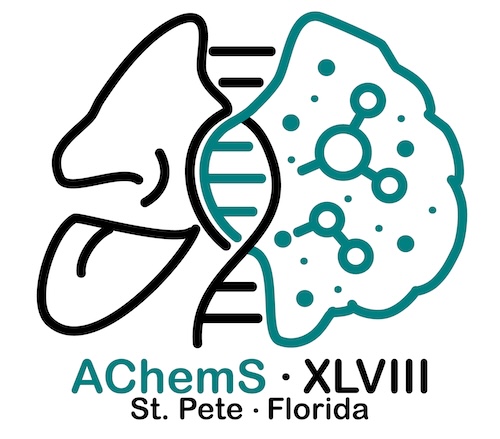AChems Press Release

Association for Chemoreception Sciences (AChemS) 45th Annual Meeting
Media Contact:
Dr. Alissa Nolden, Chair - Public Information & Affairs Committee, [email protected]
Bonita Springs, FL— Smell, taste, and chemesthesis are vital chemical senses that contribute to the multidimensional sensation of flavor. Together with other sensory inputs, they allow us to enjoy eating and drinking. Understanding the fundamental mechanisms underlying these sensations is a primary focus of the annual conference of the Association for the Chemoreception Sciences, AChemS XLV. Other key areas include factors that modulate these mechanisms and their impact on fundamental behavior in a wide array of species. Attendees and members of AChemS are leading scientific and biomedical researchers dedicated to better understanding the function of chemosensory systems, including taste and smell, across species and lifecycles, toward improving disease outcomes and overall quality of life.
Next week, the annual AChemS meeting will bring together 465 scientists and clinicians. This meeting is the nation’s leading forum on smell, taste, and chemesthesis research, which will consist of 314 of presentations. A favorite event among the members is the memorable poster sessions, with two sessions on Thursday and Friday (8-11 am and 7:30-10:30 pm) and a final session on Friday (8-11 am). There are 238 posters being presented organized into themes, such as taste transduction, olfactory dysfunction, social behavior, and taste preferences. Here we highlight some of the leading abstracts accepted to be presented at the conference https://achems.org/2023/printable-program-abstracts.php Opening remarks and a keynote presentation, delivered by Dr. Makedonka Mitreva (Washington University) on “Improving global health through (meta)genomic studies of neglected parasites,” kick off the meeting on Wednesday, April 19th, at 5 pm. A few highlights of the program, which runs through Saturday, April 22nd, include fascinating presentations on “Learning and memory in the chemical senses,“ and “Physiology of extraoral taste receptors,” and a symposium on “Sweetness and sugar reduction in the modern food system” - a timely topic given the rising rates of morbidity and mortality resulting from obesity across the global population.
Please visit AChemS (https://www.achems.org) for general and membership information as well as the full program of conference events (https://achems.org/2023/program.php).
Press Abstracts
Selected meeting presentations (embargoed until April 19th, 2023):
Contact: Nicholas Amado, [email protected]
Researchers found genetic variations influence the liking and bitterness of sweet excipient found in children’s Motrin, suggesting personalized approach could improve medicine palatability for kids.
Contact: Julie Mennella, 1(267) 978-1695, [email protected]
We investigate neuronal mechanisms underlying sickness-related odor recognition via analysis of bodily secretions (urine collected from sick mice) on a behavioral, cellular and molecular level.
Contact: Friederike Seifert, +49 241 8020824, [email protected]
Contact: Daniela Delphus, [email protected]
Contact: Thomas Hummel, +49 1523 7120007, [email protected]



